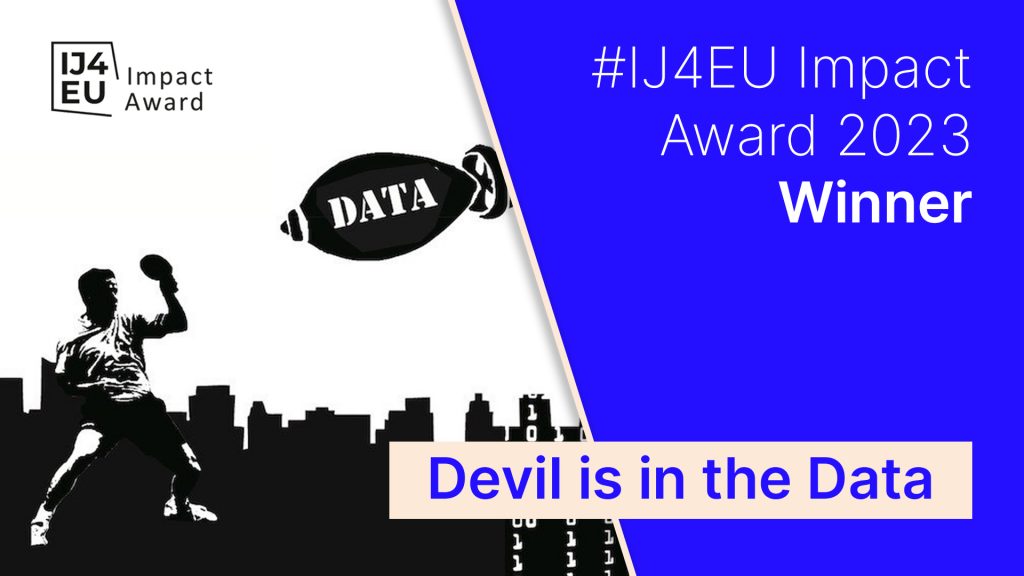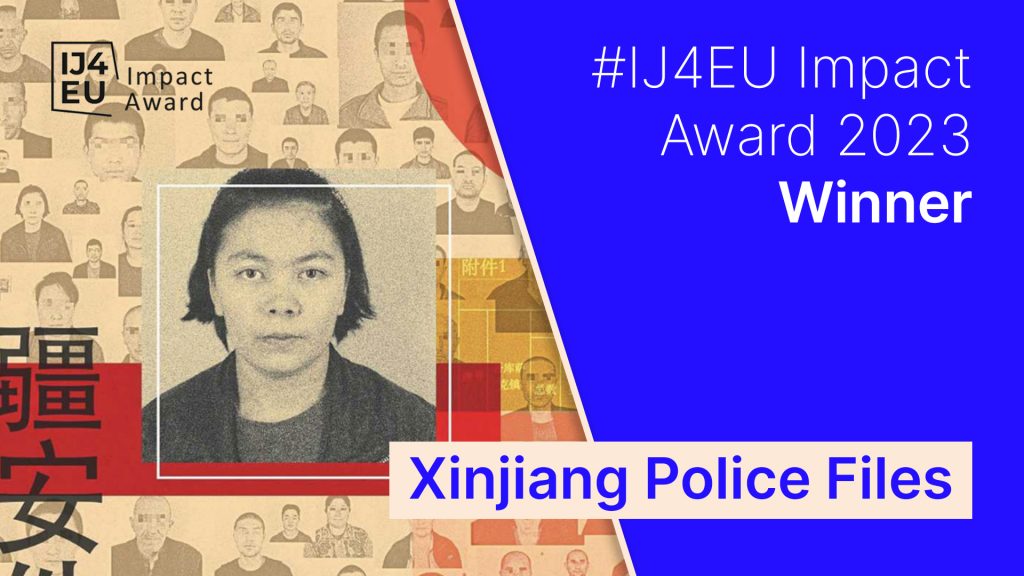Investigations on topics as diverse as corruption in sports, illegal “pushbacks” of refugees and the mass internment of Uyghurs in China have won equal honours at the IJ4EU Impact Award, the annual prize of the Investigative Journalism for Europe fund.
Three teams of journalists shared the limelight on Friday at a special ceremony for Europe’s only award devoted exclusively to cross-border investigative journalism. In no particular order, the investigations selected by an independent jury were:
Each team gets €5,000. The jury chose the winners from a shortlist of nominations made by independent evaluators assembled by the European Centre for Press and Media Freedom (ECPMF), which runs the award in cooperation with IJ4EU partners the International Press Institute (IPI) and the European Journalism Centre (EJC).
Another shortlisted investigation, Peat Pressure, received an honourable mention.
The IJ4EU Impact Award recognises the best investigative journalism by teams collaborating across borders in EU member and candidate states. The prize is open to teams regardless of whether or not they have received support from the IJ4EU fund. Among this year’s top picks, only The Devil Is in the Data had IJ4EU funding.
Winners were unveiled at the conclusion of the MFRR Summit 2023, the annual gathering of the Media Freedom Rapid Response mechanism, which supports and protects journalists under pressure.
The first prize of the evening went to a team of freelancers — Andy Brown, Philippe Auclair, Steve Menary and Jack Kerr — for their undercover investigation, The Devil Is in the Data, which reveals how live data fed to the sports betting industry can create a fertile ground for match-fixing.

Joanna Krawcyzk, chair of the jury and deputy managing director of the German Marshall Fund of the United States, praised the investigation’s innovative approach.
“Shining a light on corruption, doping, abuse, and other forms of misconduct, investigative journalists can help to promote transparency, accountability and fairness in sports,” she said.
“The Devil Is in the Data goes far beyond that. Innovative in its approach, this undercover investigation into the collaboration of sports data companies with match fixers to manipulate games was conducted jointly by a small, creative team.
“As jury members, we had no doubts that this project provides an in-depth insight into a rarely uncovered world, using bold methods, resulting in the highest quality investigative journalism with a profound impact on society.”
Next to be honoured were the journalists behind The Xinjiang Police Files. Carried out by a team of independent outlets brought together by German news site Der Spiegel, the investigation provides an unprecedented look behind China’s veil of secrecy by attaching names and faces to a brutal system that has locked away a million Uyghurs in internment camps.

“The Xinjiang Police Files constitutes an outstanding example of how a leak-driven story can round up to an impactful piece of quality investigative journalism,” said jury member Iliana Papangeli, managing director of Solomon, an Athens-based non-profit investigative organisation and IJ4EU Impact 2022 winner.
“Without the strong follow-up that the team of journalists laboriously did, there could not have been such a broad public discussion about the suffering of those affected.
“The investigation attracted worldwide attention and put the persecution of Uyghurs in the People’s Republic of China on the international agenda. Xinjiang Police Files is the kind of watchdog journalism we need, one that protects human rights and democracy.”
Unmasking Europe’s Shadow Armies was led by Lighthouse Reports, a Dutch non-profit that works with newsrooms across Europe. It gives the most detailed picture yet of a previously deniable campaign of illegal, violent “pushbacks” in Croatia, Greece and Romania by exposing the mysterious men in masks who beat asylum seekers at Europe’s borders.

“Holding powerful institutions to account is the essence of democracy,” said jury member Eric Chauvistré, a professor of journalism at the Magdeburg-Stendal University of Applied Science in Germany.
“The project Unmasking Europe’s Shadow Armies disclosed illegal practices of so-called pushbacks at the EU common external border in Southeastern Europe by national institutions using EU funding. It forced the government of Croatia to confirm the illegal practices, it caused the suspension of officers involved, and it led to several hearings on pushbacks in the European Parliament.
“It reminded us that there are still instances when journalists need to go to the mud zone and get their hands dirty. The jury was particularly impressed by the extraordinary risks the journalists were prepared to take while researching the story. Crucial evidence was collected by journalists hiding in the forests on the Bosnian-Croatian border, day and night for several weeks.”
Honourable mention went to “Peat Pressure, an investigation by Irish investigative organisation Noteworthy that exposes a system of unregulated peat extraction and how two multi-million-euro horticultural peat companies have extracted it without consent and in breach of EU environmental law.

“Peat Pressure is a perfect example of what investigative journalism is about,” said jury member Aiko Kempen, an investigative journalist at Frag Den Staat in Germany.
“In the beginning, there were no big leaks, no whistleblowers: just an idea and no data. So two journalists filed freedom-of-information requests and generated the missing data themselves, the data they needed to shine a light on an overlooked and unregulated multi-million-dollar business.
“They made clear in which way journalism can help to get a better picture of climate and environmental problems. And in the end, they had their impact: The information they gathered changed the lawmaking process in Ireland.”
‘Courage and dedication’
Ekaterina Mandova, the final jury member and a programme officer at Civitates, said investigative journalism had a huge role to play in safeguarding European democracies by exposing abuses of power and staying committed to the truth.
“Without journalism, our societies wouldn’t be what they are now. And while our fundamental rights will always need safeguarding, journalism will remain indispensable.
“As a member of the jury, I was impressed by the courage and the dedication journalists had shown in their investigations. I would like to congratulate and also thank all the award winners for trying to make our world a bit better.”
Under the rules of the IJ4EU Impact Award 2023, nominated investigations had to have been published between 1 October 2021 and 30 September 2022. Nominated investigations involved more than 430 journalists from more than 135 organisations.
IJ4EU is led by IPI, in partnership with EJC and ECPMF, and funded by the European Commission with co-funding from Open Society Foundations, Fritt Ord Foundation, Fondation Nicolas Puech and the City of Leipzig.









